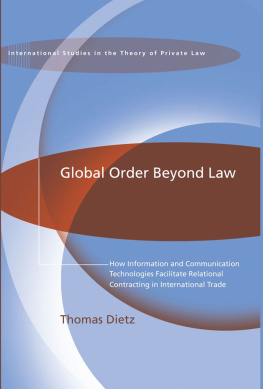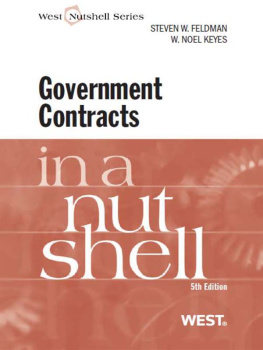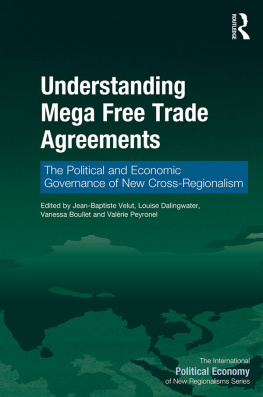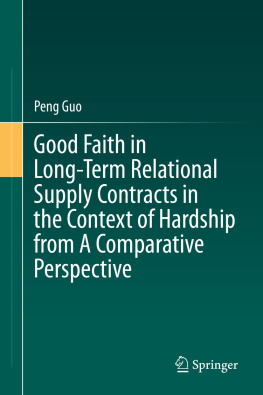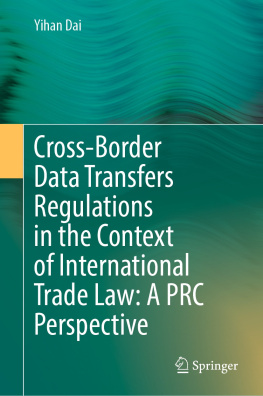
To
Benjamin and Frederik
GLOBAL ORDER BEYOND LAW
Well-functioning contract law is a crucial prerequisite for economic development. However, even though international trade has increased enormously in recent decades, we still know little about the contract enforcement mechanisms that exist in todays globalised markets. The aim of this work is to shed light on the governance of complex cross-border contracts by developing a comprehensive theoretical framework for understanding the relevance of both formal and informal institutions. This framework is then applied to an empirical study of cross-border software development contracts. Combining a unique data set of 41 qualitative expert interviews with statistical data and surveys, the author demonstrates that state contract laws show fundamental signs of dysfunction across borders. Companies engaged in globalised exchange therefore rarely use this mechanism. Even the European Unions supranational enforcement order is, in practice, insignificant. Against all expectations, international commercial arbitration also turns out to be limited in its ability to provide a workable legal infrastructure for global commerce. With global trade lacking a reliable formal legal order, companies have reacted by creating their own informal governance structures. This book explains how complex exchange in global markets has emerged in the absence of a global legal order.
International Studies in the Theory of Private Law: Volume 11
International Studies in the Theory of Private Law
This series of books edited by a distinguished international team of legal scholars aims to investigate the normative and theoretical foundations of the law governing relations between citizens. The context for such investigations of private law systems is set by important modern tendencies in systems of governance. The advent of the regulatory state marks the withdrawal of the state from direct control and management of social and economic activity, and the adoption instead of procedural regulation and co-regulatory strategies that promote the use of private law techniques of ordering and self-regulation in social and economic interactions between citizens. The tendency known as globalisation and the corresponding increases in cross-border trade produce the responses of transnational regulation of commerce and private governance regimes, and these new systems of governance challenge the hegemony of traditional national private law systems. Furthermore, these tendencies towards transnational governance regimes compel an interaction between different national legal traditions, with their differences in culture and philosophy as well as their differences based upon variations in market systems, which provokes questions not only about competing policy frameworks but also about the nature and adequacy of different kinds of legal reasoning.
The series encompasses a diverse range of theoretical approaches in the examination of these issues including approaches using socio-legal methods, economics, critical theory, systems theory, regulation theory, and moral and political theory. With the aim of stimulating an international discussion of these issues, volumes will be published in Germany, France, and the United Kingdom in one of the three languages.
Editors
Hugh Collins, London School of Economics
Christian Joerges, University of Bremen
Antoine Lyon-Caen, Universit de Paris X-Nanterre
Horatia Muir Watt, Universit de Paris I
Gunther Teubner, Frankfurt University
James Q Whitman, Yale Law School, New Haven CA
Volumes published with Hart Publishing, Oxford
1. David Campbell, Hugh Collins und John Wightman (eds), Implicit Dimensions of Contract: Discrete, Relational and Network Contracts (2003)
2. Christian Joerges, Inger-Johanne Sand and Gunther Teubner (eds), Transnational Governance and Constitutionalism (2004)
3. Oren Perez, Ecological Sensitivity and Global Legal Pluralism: Rethinking the Trade and Environment Debate (2004)
4. Harm Schepel, The Constitution of Private Governance (2004)
5. Nili Cohen and Ewan McKendrick, Comparative Remedies for Breach of Contract (2005)
6. Marc Amstutz and Gunther Teubner (eds), Networks: Legal Issues of Multilateral Co-operation (2010)
. Gunther Teubner (edited and with an Introduction by Hugh Collins), Networks as Connected Contracts (2010)
8. Christian Joerges and Josef Falke (eds), Karl Polanyi, Globalisation and the Potential of Law in Transnational Markets (2011)
9. Poul F Kjaer, Gunther Teubner and Alberto Febbrajo (eds), The Financial Crisis in Constitutional Perspective: The Dark Side of Functional Differentiation (2011)
10. Jean Braucher, John Kidwell and William C Whitford (eds) Revisiting the Contracts Scholarship of Stewart Macaulay: On the Empirical and the Lyrical (2013)
Volumes published in German by Nomos Verlagsgesellschaft, Baden-Baden
1. Peer Zumbansen, Ordnungsmuster im modern Wohlfahrtsstaat: Lernerfahrungen zwischen Staat, Geseelschaft und Vertrag (2000)
2. Dan Wielsch, Freiheit und Funktion: Zur Struktur- und Theoriegeschichte des Rechts der Wirtschaftsgesellschaft (2001)
3. Marc Amstutz, Evolutorisches Wirtschaftsrecht: Vorstudien zum Recht und seiner Methode in den Diskurskollisionen der Marktgesellschaft (2001)
4. Christian Joerges and Gunther Teubner, Gunther (eds), Rechtsverfassungsrecht: Recht-Fertigungen zwischen Sozialtheorie und Privatrechtsdogmatik (2003)
5. Gunther Teubner, Netzwerk als Vertragsverbund: Virtuelle Unternehmen, Franchising, Just in Time in sozialwissenschaftlicher und juristischer Sicht (2004)
6. Daniel Ddeyan, Macht durch Zeichen: Rechtsprobleme der Kennzeichnung und Zertifikation (2004)
7. Dietrich Claus Becker, Von Namen und Nummern: Kollisionen unvertrglicher Rechtsmassen im Interent (2005)
8. Vagias Karavas, Digitale Grundrechte: Elemente einer Verfassung des Informationsflusses im Intenet (2007)
9. Cordula Heldt, Baukooperation und Franchising als multilaterale Sonderverbindung. Vertragsnetzwerke Parallelschuldverhltnisse Personengesellschaften (2010)
10. Peter Korth, Dritthaftung von Ratingagenturen (2009)
11. Jan Lsing, Die Pflichten aus culpa in contrahendo und positiver Vertragsverletzung ( 241 II BGB): ber den hybriden Charakter der Schutzpflichten und zur Selbstbindung ohne Vertrag (2010)
12. Moritz Renner, Zwingendes transnationales Recht: Elemente einer Wirtschaftsverfas sung jenseits des Staates (2010)
Contents
If I choose German law, I get my right; but if I appear with this ruling in India and want to enforce it, the Indians might just laugh at me.
(CEO of a German software company)
Atfb is a German company selling accounting software. In May 2013, Michael Dittmar, a key sales account manager at ATFB, reported to the board that his client companies complained about the safety of the accounting software. It turned out that outsiders could get online access to confidential internal company data. The board immediately reacted to this problem and consigned Frederic Wirth, head of the quality department at ATFB, to replace major parts of the software in order to resolve this safety risk. In 2011, ATFB had decided to downsize the development department in order to focus primarily on sales efforts. Therefore, from that point forward, if there was ever a demand for new software development, ATFB would need to outsource this work to specialised software companies. Consequently, in 2013, Frederic Wirth, charged with solving the safety problems, began looking for a business partner that could perform the reprogramming. Frederic Wirth first screened the domestic market, but, as he compared the national prices for software development with prices in Eastern Europe and Asia, he immediately recognised a great business opportunity. Working together with a partner in these regions could reduce the cost for software development up to ten times. Thus, Frederic Wirth screened the global market and convinced the board to approach MBD, an Indian company located in Bangalore.
Next page
